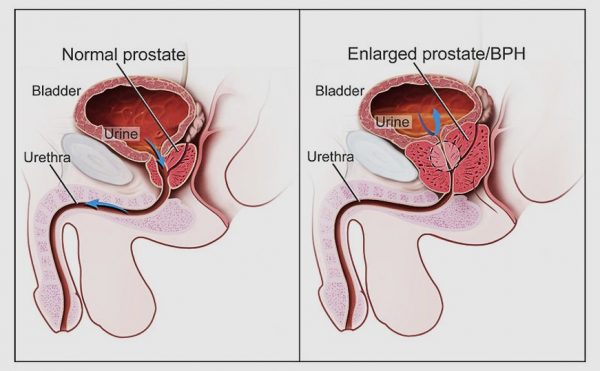
Health tips for healthy prostate
Men at certain age will develop symptoms that are related to changes in prostate health. Prostate is a walnut shaped gland that is part of male reproductive system. Prostate is present in front of the rectum, below urinary bladder. It contains two or more lobes enclosed by an outer tissue layer.
What is the function of prostate gland?
Prostate gland secrets prostate fluid that keeps sperm alive. Prostate gland is vital for male reproductive system. Prostate glands contracts during ejaculation and squirts fluid into urethra through seminal vesicles.
Prostate health is critical for men. With age certain conditions affects prostate. Some of the common medical issues that are related to prostate are:
- Prostate cancer: One of the most common form of cancer in men. One in seven men during their lifetime suffer from prostate cancer.
- Enlarged prostate: Also known as Benign prostatic hyperplasia (BPH) -Men above 50 might face this problem. Enlargement transition zone of prostate results in difficulty in urination.
- Prostatitis: Men younger than 50 years face this issue. Prostatitis is inflammation of prostate.
Symptoms of prostate problem: Different prostate conditions may have similar symptoms.
- Urination eight of more times per day
- Inability to hold or delay urination
- Frequent urination at night
- Accidental loss of urine
- Inability to empty bladder completely
- Trouble in beginning or passing urine
- Blockage of urine
- Unusual color or odor or both in urine
- Pain during urination or after ejaculation.
Diagnosis of prostate problem: Following questions and corresponding answers will help specialist to determine the condition and can recommend further tests that are needed.
- When and how often the problem occurs
- What symptoms are present in patient
- History of UTI
- Self-medication and over the counter drug prescription and prescription medication
- Caffeine and alcohol history
- Any major illness or surgeries
- Any accidents
For detecting prostate problems generally the first recommended test is, a blood test to measure prostate-specific antigen (PSA), a protein made only by the prostate gland. A PSA (Prostate specific Antibody) blood test is performed to detect or rule out prostate cancer. Based on the results further, doctors and health care providers may order additional tests, including urinalysis, urodynamic tests, cystoscopy, abdominal ultrasound, transrectal ultrasound with prostate biopsy, and imaging studies such as MRI or CT scan.
How to take care of Prostate health? To avoid any health issues with prostate, it is better to prevent and take precautions about diet and exercise.
Healthy eating is one of the easy ways to take care of prostate health. Good diet and focusing on overall pattern of healthy eating helps a person to recover or prevent any prostate condition.
- Consume more fruits and vegetables. Go for bright colored produces.
- Include leafy vegetables – spinach, lettuce, kale, amaranthus, palak and broccoli in your diet
- Whole grain bread is recommended. Avoid white pasta and white bread
- Healthy oil – olive oil, canola oil, flaxseed oil are good
- Consume almonds, pecans, walnut.
- Vitamin D – is essential element to control prostate cancer. Get exposure to good amount of sunlight and consider taking vitamin D supplements.
- Drinking right amount of fluid is essential
- Control or avoid saturated fats and partially hydrogenated fats.
- Avoid soda, sugary drinks. Sweet should be an occasional treat only
- Low sodium diet, less salt and limit on processed, canned food
- Listen to your stomach – if you are full then do not eat more. Control portion size.
Lead an active life :
- No sedentary lifestyle- Regular exercises must be part of your daily routine. According to a study, good physical activity helps to reduce BPH symptoms. Regular walking and regular physical exercises help to have a healthy prostate.
- Jagging, running for half an hour to one hour three days a week helps to reduce erectile dysfunction. Keeping up ideal body mass index (BMI) helps to keep prostate and semen level in good condition.
Get screening: Depending on age and symptoms one can fall into high-risk or an average risk group for prostate cancer. Consider getting prostate cancer screening if you are at high risk and reached age 40. Otherwise if you are at normal risk consider screenings starting at age of 55.
Improved quality of life, less or no stress, meditation, yoga, non-sedentary life, healthy lifestyle – these are key for keeping healthy prostate for life time.
References:
https://www.health.harvard.edu
https://www.hopkinsmedicine.org/
Image credit: https://commons.wikimedia.org/wiki/File:Benign_Prostatic_Hyperplasia_nci-vol-7137-300.jpg
Attribution:Unknown author / Public domain
Author: Sumana Rao | Posted on: August 8, 2019
« Hot Flash symptoms and remedies Tips to prevent heart attack in women »






















Write a comment